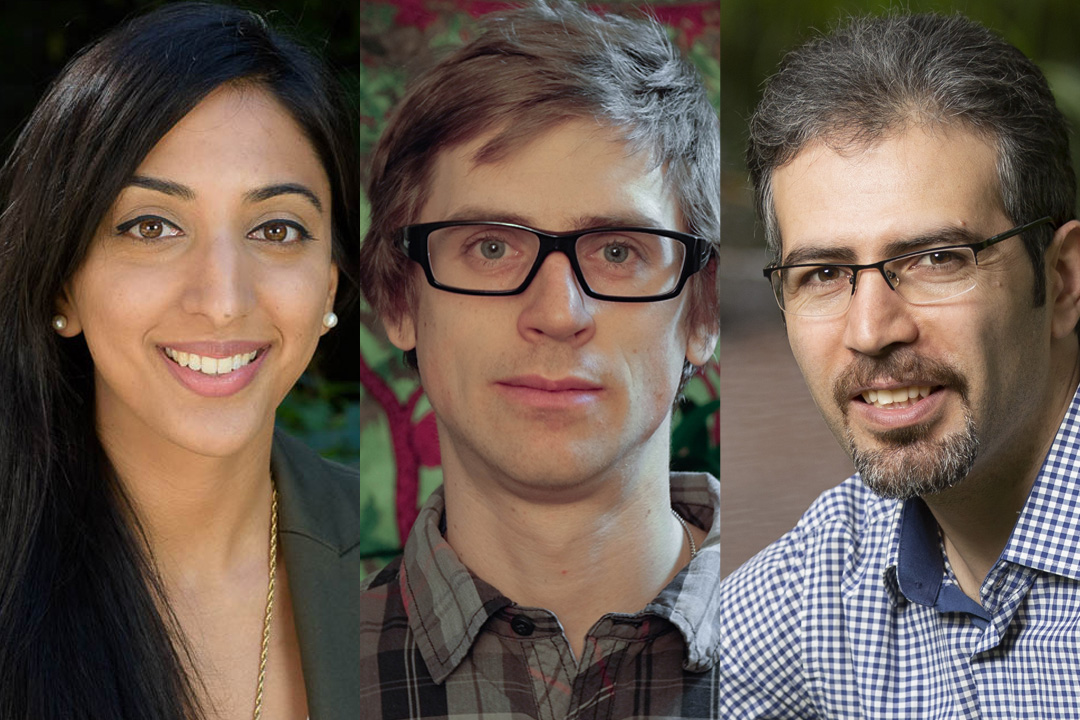
Meet USask's new Banting and Vanier researchers
Three exceptional young University of Saskatchewan (USask) researchers have been awarded national Banting and Vanier Canada awards to advance research focused on climate change and water security.
By Federica GiannelliUSask health policy researcher Jasmin Bhawra and geological sciences researcher Dr. Elliott Skierszkan (PhD) have been awarded highly competitive Banting Postdoctoral Fellowships totaling $280,000 for climate change-related research. Chemical engineering PhD student Khaled Zoroufchi Benis will receive $150,000 over three years through a Vanier Canada Graduate Scholarship to advance water research.
“These talented scholars will become research leaders of tomorrow and contribute through the impact of their discoveries to Canada’s economic and social growth,” said USask Vice-President Research Dr. Karen Chad (PhD).
Investigating climate change
Working with northern Indigenous communities, Bhawra will investigate the impact of climate change on mental health and food security using a new mobile phone SMART platform to gather population health data.
“Climate change and natural disasters such as floods and droughts contribute to anxiety and depression, and these issues are exacerbated among those who struggle with food insecurity,” she said. “We will look at how climate change affects the food system, and strategies Indigenous Peoples are using to cope with these changes and develop community-driven adaptation policies.”
While shorter winters may mean longer growing seasons, it is less viable for many northern communities to acquire food in traditional fishing and hunting grounds due to changes in wildlife and the environment.
“The Indigenous communities will take center stage,” said Bhawra. “Using our smartphone-based platform, they will provide direct feedback on their mental health and food access issues and engage in real time with researchers and other community members.”
The plan is to share the results with the communities months before publication, so the communities can make timely decisions based on this knowledge.
“Our research will provide policy makers with the information they need for ongoing monitoring and program planning to improve food access for these communities and elsewhere in Canada,” said USask public policy professor Dr. Ken Coates (PhD), Bhawra’s supervisor at USask’s Johnson Shoyama Graduate School of Public Policy where the smartphone platform was developed through the school’s Digital Epidemiology and Population Health Laboratory.
Improving water security
Using the Canadian Light Source synchrotron, Skierszkan will study how warming temperatures in Northern Canada influence natural uranium release from rocks and sediments into water sources.
High uranium concentrations in northern water sources occur frequently. Excessive exposure is known to be harmful to fish and human kidneys.
“Our research draws attention to the need to monitor water quality even in areas with no direct impact from industrial activities, and will also help identify areas of concern for groundwater management,” said Skierszkan, who was attracted to USask by the excellence of the university’s water research.
Climate change and thawing permafrost are causing shifts in groundwater chemistry and flow, but it is unclear how these changes will affect the release of uranium from rocks and sediments.
“Understanding how these changes happen will enable us to better predict future impacts on water security in northern regions,” said USask geological sciences professor Dr. Matt Lindsay (PhD).
Developing safer drinking water
Zoroufchi Benis is developing a “green” bio-filter to remove arsenic from water and help make drinking water safer.
One-third of Canadians rely on groundwater as a source for drinking water. While arsenic is naturally present in water at various concentrations, these natural levels are not always safe. Exposure to arsenic may cause health problems such as cancer, diabetes and heart disease.
“Our filter, made from biochar (activated carbon from agricultural waste) and highly arsenic-resistant microalgae, aims to remove the arsenic from water by combining these two natural materials that have separately shown promise for capturing this metal,” said Zoroufchi Benis.
Using the Canadian Light Source, he will study the properties of these materials and create a more efficient bio-filter that would be cheaper and safer compared to the current processes that rely on chemicals.
“Our bio-compatible filter may have an impact around the world in countries such as India and Bangladesh where arsenic contamination is a big issue,” said USask chemical engineering professor Dr. Jafar Soltan (PhD), Zoroufchi Benis’ co-supervisor.
Arsenic contamination in water is an historic and ongoing Canadian and worldwide human health issue, said engineering associate professor Dr. Kerry McPhedran (PhD), Zoroufchi Benis’ co-supervisor.
“Our team is confident this research will result in an effective bio-filter technology,” McPhedran said.
Zoroufchi Benis, who came to USask from Iran, said, “Being a Vanier recipient will help me reach my dream of doing something for saving the environment.”

